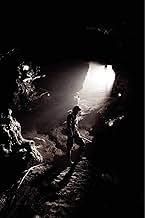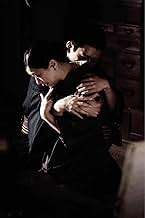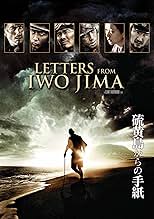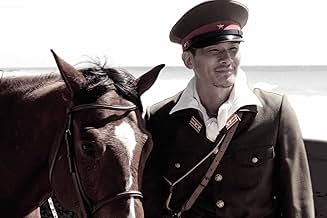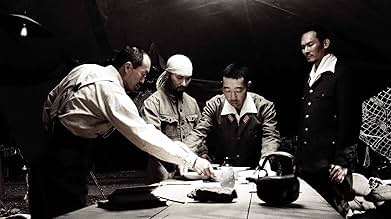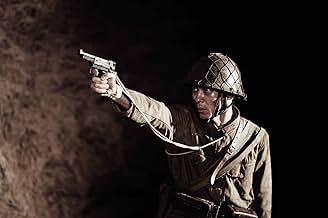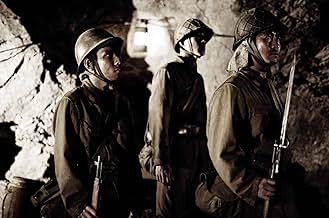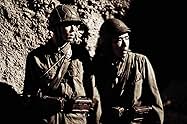La storia della battaglia di Iwo Jima tra gli Stati Uniti e il Giappone imperiale durante la seconda guerra mondiale, raccontata dalla prospettiva dei giapponesi che la combatterono.La storia della battaglia di Iwo Jima tra gli Stati Uniti e il Giappone imperiale durante la seconda guerra mondiale, raccontata dalla prospettiva dei giapponesi che la combatterono.La storia della battaglia di Iwo Jima tra gli Stati Uniti e il Giappone imperiale durante la seconda guerra mondiale, raccontata dalla prospettiva dei giapponesi che la combatterono.
- Regia
- Sceneggiatura
- Star
- Vincitore di 1 Oscar
- 25 vittorie e 39 candidature totali
Shidô Nakamura
- Lieutenant Itô
- (as Shidou Nakamura)
Luke Eberl
- Sam
- (as Lucas Elliot)
Sonny Saito
- Medic Endô
- (as Sonny Seiichi Saito)
Recensioni in evidenza
Did it really last two and a half hours? It felt felt a lot shorter than that.
No, this is not an action war film with nonstop blood baths. It is a film that pulls the humanity out of the monster that is war.
This is one of, if not the best, movie ever directed by Clint Eastwood. I usually have a hard time following plots with many characters because they make me lose focus on the general story, but this one is done well. Not only am I engaged, I also become attached to every character and feel and understand their conflicts.
It does not matter who fights on the right or wrong side of WWII. This film goes beyond that. It is about what is right or wrong for the individual human being. It excels as a story about the human heart.
No, this is not an action war film with nonstop blood baths. It is a film that pulls the humanity out of the monster that is war.
This is one of, if not the best, movie ever directed by Clint Eastwood. I usually have a hard time following plots with many characters because they make me lose focus on the general story, but this one is done well. Not only am I engaged, I also become attached to every character and feel and understand their conflicts.
It does not matter who fights on the right or wrong side of WWII. This film goes beyond that. It is about what is right or wrong for the individual human being. It excels as a story about the human heart.
Don't listen to the people who call this movie inaccurate or revisionist history.
The movie is accurate. There were people on both sides of the war who at times showed kindness.
Labeling all the Japanese soldiers as people who tortured POWS would be like saying all American soldiers in Vietnam killed and rape innocent Vietnamese. Or all American soldiers in Cuba tortured POWS from the wars in the Middle East. You can't group people together like that.
This movie shows better than any other film that there's really no good guys or bad guys when it comes to war. War is just pointless.
The movie is not supposed to be a documentary so the people who bash it for little details should go rent a documentary if thats what they want to see.
Also, Clint Eastwood deserves major credit for telling both sides of the war. Too many war movies always show the enemy as "heartless monsters" when it reality its never like that.
This is without a doubt the best movie of the year. Make sure you go see it.
The movie is accurate. There were people on both sides of the war who at times showed kindness.
Labeling all the Japanese soldiers as people who tortured POWS would be like saying all American soldiers in Vietnam killed and rape innocent Vietnamese. Or all American soldiers in Cuba tortured POWS from the wars in the Middle East. You can't group people together like that.
This movie shows better than any other film that there's really no good guys or bad guys when it comes to war. War is just pointless.
The movie is not supposed to be a documentary so the people who bash it for little details should go rent a documentary if thats what they want to see.
Also, Clint Eastwood deserves major credit for telling both sides of the war. Too many war movies always show the enemy as "heartless monsters" when it reality its never like that.
This is without a doubt the best movie of the year. Make sure you go see it.
Not having seen Flags of Our Fathers, I'll be unable to make any comparison to its companion-movie. Even on its own Letter to Iwo Jima could be seen as representing the new tendency to "humanise" what were until recently the traditional WW2 villains from an Anglosaxon point of view. History tends to be written by those on the winning side - hence, we have had decades of inhuman German war machines, cowardly Italians and unspeakably cruel Japanese. Now, over 60 years since WW2, it has become acceptable - nay, the done thing if you have a conscience, to humanise the losers and show even the winners as fallible and even individually despicable (***SPOILER:*** see the American soldier who shoots the two Japanese prisoners who've deliberately given themselves over. ***END OF SPOILER***). Letters to Iwo Jima clearly has its heart in the right place: it wants to be objective, above and beyond anything else. And it is. Japanese soldiers have mothers, adorable young pregnant wives in pretty kimonos and sons they write loving letters to. We empathise with them no less than we have with all those American soldiers in an endless string of war movies. Technically, Letters is a well-made movie. It's also genuinely moving in parts - you do end up caring for most of the main players. For my personal taste, though, it spells things out too much and too often. Still, for something produced by Mr Manipulative Spielberg and co-written by Paul "Crash" Haggis, I was impressed.
The companion film to "Flags of Our Fathers" shows the battle of Iwo Jima from the Japanese point of view. Starting with the building of fortifications, hiding from relentless bombardment, and fending off an equally strong attack as American troops land on the island.
"Letters from Iwo Jima" just like "Flags of Our Fathers" is a first rate war movie with a relevant message with its critical nature. "Flags" showed the selling of war and "Letters" does the same, albeit with a different mind-set. Japan was an empire governed by a monarch back then so the military mentality was quite different, but it is also important to note the similarities. Especially at the base of the social pyramid where it is quite apparent that people are people no matter where you go.
Virtually all of the uber-patriotic tendencies that were rampant in Imperial Japan during WWII were also in Nazi Germany and, as both "Flags" and "Letters" demonstrate in the United States as well. People were used for the purpose of the government and were fed propaganda just the same. Maybe a different in a different form, but in the end it is all the same.
Ken Wantanbe is the film's highlight as a military man torn between his sense of duty and his inner feelings. As commander of the island he sees amongst his men the fanaticism, the pacifism, the "just do our job" crowd, and many other configurations of thought in between and mixed with the others. Even strange that some men initially want to fight and are proud to serve in the military and what's shocking is that some of their wives and mothers believe the same.
That paints a landscape of war as something amidst all of the stereotypes that have been made of it. Since that is where the truth usually lies, amidst all the gray matter. --- 9/10
Rated R: war violence/carnage
"Letters from Iwo Jima" just like "Flags of Our Fathers" is a first rate war movie with a relevant message with its critical nature. "Flags" showed the selling of war and "Letters" does the same, albeit with a different mind-set. Japan was an empire governed by a monarch back then so the military mentality was quite different, but it is also important to note the similarities. Especially at the base of the social pyramid where it is quite apparent that people are people no matter where you go.
Virtually all of the uber-patriotic tendencies that were rampant in Imperial Japan during WWII were also in Nazi Germany and, as both "Flags" and "Letters" demonstrate in the United States as well. People were used for the purpose of the government and were fed propaganda just the same. Maybe a different in a different form, but in the end it is all the same.
Ken Wantanbe is the film's highlight as a military man torn between his sense of duty and his inner feelings. As commander of the island he sees amongst his men the fanaticism, the pacifism, the "just do our job" crowd, and many other configurations of thought in between and mixed with the others. Even strange that some men initially want to fight and are proud to serve in the military and what's shocking is that some of their wives and mothers believe the same.
That paints a landscape of war as something amidst all of the stereotypes that have been made of it. Since that is where the truth usually lies, amidst all the gray matter. --- 9/10
Rated R: war violence/carnage
At the conclusion of the film a person behind me said, "Incredible," twice. Another person followed with, "A masterpiece." I would concur. Perhaps it isn't a perfect film but it is a movie with great impact. I find that it is a testament to the skill of Clint Eastwood as a director and Iris Yamashita as screenwriter that some of the scenes that had the greatest impact were of minor thingsa letter read out loud, the way someone saluted, a tear, a song...
There were no clear cut heroes or villains beyond "war" itself. I'm reminded of that saying, "No one wins a war. One side simply loses more than the other." War diminishes us all. We must learn to turn our backs on such endeavors even if it means that the military/industrial death merchants take a cut in profits or that they truly learn to hammer swords into plow shares.
If the film were to depict the battle in a manner that was realistically experienced by the soldiers the film would be unbearable to any viewer. One must see the battle and history as a kind of allegorical backdrop to a story about the utter inhumanity and futility of war. As a film it had to illustrate the overall societal insanity of war through a human lens, and it did this in a deeply moving way.
There were no clear cut heroes or villains beyond "war" itself. I'm reminded of that saying, "No one wins a war. One side simply loses more than the other." War diminishes us all. We must learn to turn our backs on such endeavors even if it means that the military/industrial death merchants take a cut in profits or that they truly learn to hammer swords into plow shares.
If the film were to depict the battle in a manner that was realistically experienced by the soldiers the film would be unbearable to any viewer. One must see the battle and history as a kind of allegorical backdrop to a story about the utter inhumanity and futility of war. As a film it had to illustrate the overall societal insanity of war through a human lens, and it did this in a deeply moving way.
Lo sapevi?
- QuizShot back-to-back with Flags of Our Fathers (2006).
- BlooperThe bottle of Johnnie Walker appears to have a screw cap made of aluminum. At that time liquor bottles had a cork stopper.
- Citazioni
General Tadamichi Kuribayashi: If our children can live safely for one more day it would be worth the one more day that we defend this island.
- Colonne sonoreString Quartet No.6, Op. 1-6, Hob. III-6, Mov.2
Composed by Joseph Haydn
At a party where Ken Watanabe participated
I più visti
Accedi per valutare e creare un elenco di titoli salvati per ottenere consigli personalizzati
Dettagli
- Data di uscita
- Paese di origine
- Siti ufficiali
- Lingue
- Celebre anche come
- Cartas desde Iwo Jima
- Luoghi delle riprese
- Aziende produttrici
- Vedi altri crediti dell’azienda su IMDbPro
Botteghino
- Budget
- 19.000.000 USD (previsto)
- Lordo Stati Uniti e Canada
- 13.756.082 USD
- Fine settimana di apertura Stati Uniti e Canada
- 89.097 USD
- 24 dic 2006
- Lordo in tutto il mondo
- 68.673.228 USD
- Tempo di esecuzione
- 2h 21min(141 min)
- Colore
- Mix di suoni
- Proporzioni
- 2.39 : 1
Contribuisci a questa pagina
Suggerisci una modifica o aggiungi i contenuti mancanti







